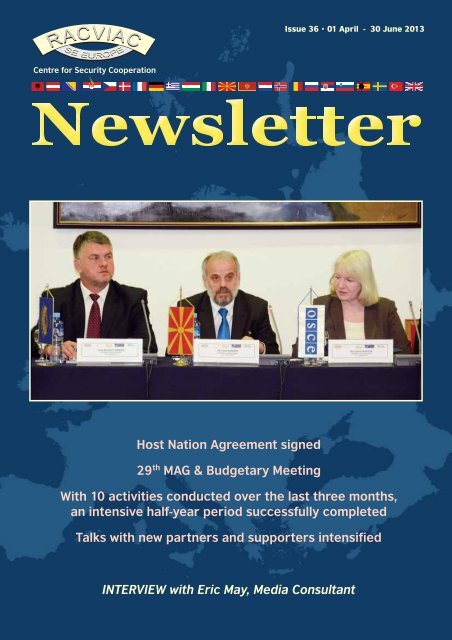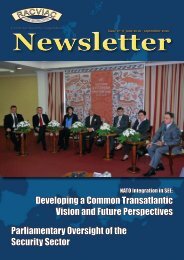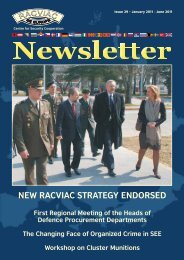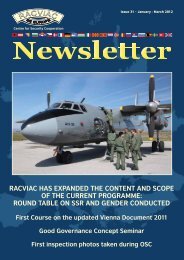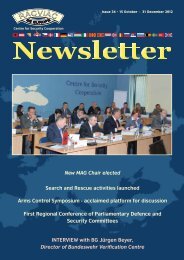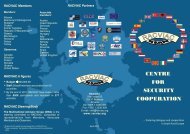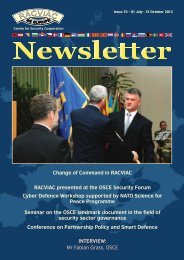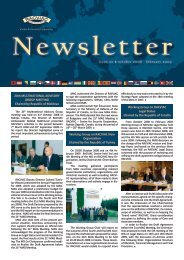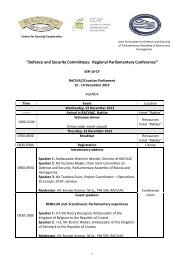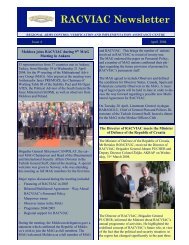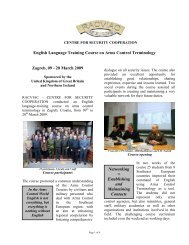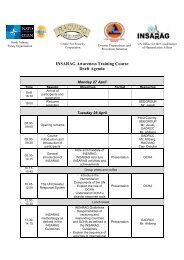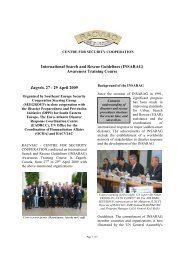Newsletter #36 - RACVIAC
Newsletter #36 - RACVIAC
Newsletter #36 - RACVIAC
You also want an ePaper? Increase the reach of your titles
YUMPU automatically turns print PDFs into web optimized ePapers that Google loves.
Issue 36 • 01 April - 30 June 2013<br />
Centre for Security Cooperation<br />
Host Nation Agreement signed<br />
th<br />
29 MAG & Budgetary Meeting<br />
With 10 activities conducted over the last three months,<br />
an intensive half-year period successfully completed<br />
Talks with new partners and supporters intensified<br />
INTERVIEW with Eric May, Media Consultant
CONTENTS<br />
<strong>RACVIAC</strong> management at RASR Workshop<br />
(02)<br />
Host Nation Agreement signed<br />
(02)<br />
Defence Conversion Project presented<br />
(03)<br />
Firefighting exercise<br />
(03)<br />
NATO quiz competition<br />
(04)<br />
Visit of Croatian Defence Academy<br />
(04)<br />
Visit of UNODA representative<br />
(04)<br />
LoE with KAS<br />
(05)<br />
Director at SEEC meeting<br />
(05)<br />
DD's visit to German Air Base<br />
(06)<br />
Spring MAG & Budgetary Meeting<br />
(06)<br />
Interview with Eric May<br />
(08)<br />
Border Security<br />
(10)<br />
PMSC vs NSS<br />
(11)<br />
Search and Rescue Course<br />
(12)<br />
Workshop on Defence Procurement<br />
(13)<br />
Visits to/outside <strong>RACVIAC</strong><br />
<strong>RACVIAC</strong> Director and Deputy Director attended the<br />
RASR Workshop<br />
<strong>RACVIAC</strong> Director Ambassador Branimir Mandic and Deputy Director Brigadier<br />
General Zdravko Jakop participated in the 6th Workshop of the South East Europe<br />
Regional Approach to Stockpile Reduction (RASR) of Conventional Weapons and<br />
Munitions, held in the period of 4-5April2013inBled,Republic of Slovenia.<br />
In accordance with the workshop agenda, Ambassador Mandic chaired two sessions:<br />
“Western Balkan experiences in the area of import-export and transit of<br />
weapons/ammunition and dual-use goods” and “Presentations of RASR member<br />
states on their national frameworks regulating the area of import-export and transit of<br />
weapons/ammunition and dual-use goods”, while Brigadier General Jakop gave a<br />
presentation on <strong>RACVIAC</strong> - Centre for Security Cooperation.<br />
Before handing over the floor to the speakers, Ambassador Mandic pointed out that<br />
Small Arms and Light Weapons, conventional weapons and ammunition and dual-use<br />
goods had been on the agenda of many events of different organizations for decades.<br />
However, he emphasized “it is clear that there is no single model for an export control<br />
system due to the great diversity in the legal and administrative systems in different<br />
countries”. He added that there were some key elements, which any export control<br />
system should have in order to be effective. These include clear legal basis<br />
establishing jurisdiction over relevant parties and activities, a transparent inter-agency<br />
coordination and decision-making, mechanism for licensing, enforcement authorities,<br />
etc. He concluded by saying that in the SEE there were several hundred thousand<br />
tons of surplus weapons and ammunition to be destroyed and while some of these<br />
could be destroyed in place, others had to be taken to a proper facility.<br />
Host Nation Agreement signed<br />
Oslo Convention Workshop<br />
(14)<br />
Women's Role in Border Management<br />
(15)<br />
Dayton Art IV Course<br />
(16)<br />
Strategic Communication Conference<br />
(17)<br />
Prevention of Corruption Workshop<br />
(18)<br />
Hellos<br />
(19)<br />
Goodbyes<br />
(20)<br />
Forthcoming events<br />
(21)<br />
<strong>Newsletter</strong> editorial staff<br />
Capt Marija Cicak<br />
Ms Anita Boljevac, Language Specialist<br />
<strong>RACVIAC</strong> -<br />
Centre for Security<br />
Cooperation<br />
Rakitje, Stari hrast 53<br />
10437 Bestovje, Croatia<br />
Tel: +385 (0)1 3330 803<br />
Fax: +385 (0)1 3330 809<br />
info¹racviac.org<br />
www.racviac.org<br />
Pursuant to Article 19 of the Agreement on <strong>RACVIAC</strong> - Centre for Security<br />
Cooperation, the Host Nation Agreement (HNA) was signed on the 11th of April 2013.<br />
On behalf of the Government of the Republic of Croatia, the Agreement was signed<br />
by Mr Zeljko Klisovic, Deputy Minister of Foreign and European Affairs (MFEA), while<br />
Ambassador Branimir Mandic, Director of <strong>RACVIAC</strong>, signed it on behalf of the Centre.<br />
The signing ceremony was also attended by Ms Vesna Batistic Kos, MAG<br />
Chairperson and Assistant Minister for Multilateral Affairs and Global Issues at the<br />
MFEA, Mr Zoran Drca, Assistant Minister of Defence, and Brigadier General Zdravko<br />
Jakop, <strong>RACVIAC</strong> Deputy Director.<br />
The Agreement defines legal personality, capacity, privileges and immunities of<br />
<strong>RACVIAC</strong> as an international organization seated in Croatia as well as privileges and<br />
immunities of <strong>RACVIAC</strong> personnel.<br />
2
Visits to/outside <strong>RACVIAC</strong><br />
Upon signing the HNA, Mr Klisovic said that <strong>RACVIAC</strong> proved to be a reliable partner and an important factor in promoting<br />
regional security dialogue and common values. He added that the HNA was also a step forward, proving that <strong>RACVIAC</strong> was no<br />
longer an initiative, but rather an international, regionally owned organization.<br />
Ambassador Mandic used this opportunity to reiterate his appreciation for the great support Croatia has been providing to the<br />
Centre since its establishment. He pointed out that the HNA would be an additional incentive to the Member countries to pursue<br />
the Centre's mission and second personnel, thus fulfilling the obligations accepted under the Agreement on <strong>RACVIAC</strong> - Centre for<br />
Security Cooperation.<br />
<strong>RACVIAC</strong> Research Project on Defence Conversion presented<br />
On 16 April 2013, in the margins of the 29th MAG Meeting,<br />
<strong>RACVIAC</strong> SSR Pillar Research Project entitled “Defence<br />
Conversion Modalities in South-East Europe (SEE) - Specific<br />
Regional Model” was presented.<br />
<strong>RACVIAC</strong> first started tackling the subject matter of defence<br />
conversion following the Concept Paper on Defence Conversion<br />
in South Eastern Europe issued after the meeting of Defence<br />
Ministries of South-East European Cooperation Process, held in<br />
Bucharest in 2005. In pursuance of this Concept Paper, <strong>RACVIAC</strong><br />
organized more than 20 workshops addressing the issues of<br />
transition of military personnel and military base conversion.<br />
This endeavour continued with the project on defence<br />
conversion modalities in South Eastern Europe launched in 2011.<br />
The project included experts nominated by the Republic of<br />
Albania, Republic of Croatia, Bosnia and Herzegovina, Republic<br />
of Moldova, the Former Yugoslav Republic of Macedonia*<br />
and<br />
the Republic of Serbia, who were designated to two project<br />
areas: Transition of Military Personnel and Military Base<br />
Conversion.<br />
It is worth mentioning that this project, which resulted in<br />
publishing a booklet on defence conversion modalities in the<br />
SEE, also reflects the great cooperation and support provided by<br />
the Kingdom of Norway and the Republic of Slovenia.<br />
Fire-fighting exercise took place in Rakitje barracks<br />
With a view to continuing the good practice established in<br />
previous years, a fire-fighting exercise organized by the<br />
International Military Operations Training Centre (IMOTC)<br />
took place on 30 April 2013 in the Rakitje barracks.<br />
The exercise scenario started with a fire alarm siren and all<br />
<strong>RACVIAC</strong> staff was obliged to follow standard operating<br />
procedure in case of fire. Fire-fighters, coming from the local<br />
volunteer fire-fighting brigades based in Sveta Nedelja and<br />
Rakitje, demonstrated procedures in several cases:<br />
extinguishing a fire in a building, evacuation of injured<br />
personnel, extinguishing a burning vehicle. All IMOTC and<br />
<strong>RACVIAC</strong> personnel had the opportunity to try out fire<br />
extinguishers and practice extinguishing flames outdoors.<br />
Finally, fire-fighting equipment and vehicles were exhibited.<br />
Thanks to the fire-fighting brigades from Rakitje and Sveta<br />
Nedjelja the staff inside the barracks rests assured they are<br />
in safe hands in case a fire breaks out. On that note, small tokens of appreciation were presented to the brigades by the barracks<br />
and IMOTC Commander Lt Col Ivica Plejic and by <strong>RACVIAC</strong> Deputy Director Brigadier General Zdravko Jakop.<br />
* Turkey recognizes the Republic of Macedonia with its constitutional name.<br />
3
Visits to/outside <strong>RACVIAC</strong><br />
<strong>RACVIAC</strong> provides support in NATO quiz competition<br />
The Croatian city of Dubrovnik will host one of the largest political meetings in 2013 - the<br />
autumn session of the NATO Parliamentary Assembly, taking place from 11 to 14 October this<br />
year. Some 800 parliamentarians from 28 NATO member countries are expected to attend<br />
the 59th NATO Parliamentary Assembly Session, the biggest political meeting ever to be held<br />
on Croatian soil. Among others, the conference will be attended by the entire Croatian state<br />
leadership, NATO Secretary General Anders Fogh Rasmussen and possibly the US Secretary<br />
of State John Kerry. It will focus on the topics that have been dominating the world's politics,<br />
such as Afghanistan, Syria, the Arab Spring and the smart defence concept.<br />
In order to promote this event as much as possible, especially among high school and<br />
university students, the Croatian Parliamentary Delegation to NATO and North Atlantic<br />
Promotion Organization (NAPO) are organizing a NATO quiz competition in four South-<br />
Croatian Counties (Zadar County, Sibenik - Knin County, Split - Dalmatia County and Dubrovnik<br />
- Neretva County). The final competition will be held in <strong>RACVIAC</strong>, while the quiz winners will<br />
be awarded a trip to Brussels and a visit to the NATO HQ. They will also be introduced to the participants in the autumn session<br />
of the Parliamentary Assembly in Dubrovnik.<br />
Supporting the Croatian Parliamentary Delegation to NATO in the organization of the above mentioned event, <strong>RACVIAC</strong> Deputy<br />
Director Brigadier General Zdravko Jakop took part in the promotional campaign organized from 06 to 07 May 2013 across the<br />
region of Dalmatia.<br />
Representatives of Croatian Defence Academy visited <strong>RACVIAC</strong><br />
Representatives of the Croatian<br />
Defence Academy, headed by the<br />
Dean of the Academy, Colonel<br />
Zeljko Akrap, visited <strong>RACVIAC</strong> -<br />
Centre for Security Cooperation on<br />
03 June 2013 in order to get better<br />
acquainted with <strong>RACVIAC</strong> mission,<br />
aims and activities.<br />
The guests were welcomed by<br />
<strong>RACVIAC</strong> Director, Ambassador<br />
Branimir Mandic, and Deputy<br />
Director, Brigadier General Jakop,<br />
as well as by other senior staff<br />
members. <strong>RACVIAC</strong> Deputy Director<br />
provided the guests with a brief<br />
outline of <strong>RACVIAC</strong>'s history,<br />
mission, annual programme of<br />
activities and completed process of transformation, while <strong>RACVIAC</strong> Director outlined the results achieved in the recent months<br />
and the Centre's intention to broaden the scope of its activities and network of partners. He also introduced some basic plans<br />
for the forthcoming period.<br />
Since both organizations are academically oriented, the meeting was also aimed at discussing a broader and more specific<br />
cooperation between the Defence Academy and <strong>RACVIAC</strong>. After a comprehensive Q&A session and a subsequent open<br />
discussion, both organizations recognized some complementary activities and areas for a closer and deeper collaboration,<br />
which could contribute to the dialogue and security cooperation in South East Europe.<br />
Political Advisor of UNODA visited <strong>RACVIAC</strong><br />
On 19 June 2013, Mr Nikita Smidovich, Political Advisor, United Nations Office for Disarmament Affairs (UNODA), accompanied<br />
by Ms Sanja Bujas Juraga and Ms Ivana Zerec from the Croatian Ministry of Foreign and European Affairs, visited <strong>RACVIAC</strong> -<br />
Centre for Security Cooperation.<br />
The purpose of the visit was the wish expressed by Mr Smidovich to discuss possible ways of further, more intensified<br />
cooperation between <strong>RACVIAC</strong> and UNODA.<br />
4
Visits to/outside <strong>RACVIAC</strong><br />
The guests were welcomed by <strong>RACVIAC</strong> Director Ambassador Branimir Mandic, Deputy Director Brigadier General Zdravko<br />
Jakop and <strong>RACVIAC</strong> senior staff members. Mr Smidovich presented UNODA's efforts and current issues concerning the<br />
implementation of the UNSCR 1540, as well as<br />
the main areas they are currently focused on.<br />
With a view to extending UNODA's<br />
cooperation to some regional organizations,<br />
Mr Smidovich outlined the idea to organize<br />
events on effective practices in the<br />
implementation of the UNSC Resolution 1540,<br />
using <strong>RACVIAC</strong> as a platform of the member<br />
states and a possible regional promoter of<br />
the UNSCR 1540.<br />
Subsequently, the guests and the hosts<br />
engaged in a more detailed discussion on<br />
potential activities and plans for the future.<br />
Both sides agreed that the pilot event could<br />
be a workshop co-organized in September<br />
2013 dealing with effective practices in the<br />
implementation of the Resolution 1540.<br />
<strong>RACVIAC</strong> and Konrad Adenauer Stiftung signed the Letter of Exchange<br />
On 21 June 2013, Mr Michael A. Lange from the Konrad Adenauer Stiftung Office Croatia and Ambassador Branimir Mandic,<br />
Director of <strong>RACVIAC</strong> - Centre for Security Cooperation signed the Letter of Exchange between the two organizations. The Letter<br />
of Exchange is aimed at establishing a framework governing mutual organizational and financial procedures and responsibilities<br />
for the preparation and execution of the Conference “European Union External Border Regime'' to take place in September 2013.<br />
While not the first event dealing with the issues of<br />
the EU border security, the Conference is<br />
definitely the first Croatian project activity aimed<br />
at looking into the new EU member country's<br />
post-accession border security situation. The<br />
purpose of this joint Conference lies in the<br />
original idea that the Croatian joining the EU<br />
border security system ought not to be looked at<br />
as the closure of the individual transformation<br />
processes but rather as the start of the<br />
consequent full-member EU transformation<br />
phase in the area of border security system<br />
transformation. The Conference concept has<br />
been developed in cooperation among the<br />
Alumni Association of George C. Marshall<br />
Republic of Croatia, Konrad Adenauer Stiftung<br />
Office in Croatia and <strong>RACVIAC</strong> - Centre for<br />
Security Cooperation.<br />
<strong>RACVIAC</strong> Director attended the 13<br />
th<br />
SEEC Conference<br />
<strong>RACVIAC</strong> Director Ambassador Branimir Mandic participated in the 13th SEEC - Forum for Western Balkans Defence Cooperation<br />
Conference, taking place in the period of 25 - 27 June 2013 in Sarajevo, Bosnia and Herzegovina. This year's conference was<br />
focused on the topic of strengthening defence reform in the Western Balkans through regional cooperation and professional<br />
military education.<br />
The issues discussed included the status, management, financing and future needs of regional training centres, experiences in<br />
regular exchange of participants, experts and trainers, as well as top five priorities for defence reform in the Western Balkan<br />
countries at the strategic level.<br />
5
Visits to/outside <strong>RACVIAC</strong><br />
As part of the panel on “Regional Cooperation in the Western Balkans”, Major Ove Urup-Madsen from the Tactical Air Command<br />
Denmark gave a presentation on the regional search and rescue cooperation and its connection to <strong>RACVIAC</strong>. It is worth<br />
mentioning that <strong>RACVIAC</strong> has started dealing with this issue in 2011. With the support of the Tactical Air Command Denmark,<br />
<strong>RACVIAC</strong> has so far conducted two events on the regional search and rescue development. A recent event conducted in April<br />
this year supported upgrading and development of national and regional search and rescue systems and promoted their<br />
importance through the SAR Letter of Intent that was signed during the event by four regional countries.<br />
<strong>RACVIAC</strong> Deputy Director visited Spangdahlem Air Base<br />
<strong>RACVIAC</strong> Deputy Director visited the Spangdahlem Air Base on June 27 to get an insight into the daily maintenance and<br />
operations of the combat air base. The visit was part of the Vienna Document '11 Agreement, which is a politically binding<br />
measure designed to enhance confidence and security among the participating nations.<br />
Participating countries included nations with air forces that operate in the territories, surrounding sea areas and air spaces of<br />
Europe and central Asia. The open demonstrations of military capabilities and resources are designed to foster trust, which in<br />
turn enhances regional peace and stability. The participants toured different areas of the base to observe the 52nd Fighter<br />
Wing's daily operations. Afterwards, based on the wing's performance, they discussed whether or not the U.S. government had<br />
met the obligations of the Vienna Document '11. This was the first time that Spangdahlem directly supported the Agreement.<br />
Meetings<br />
The 29<br />
th<br />
MAG and Budgetary Meeting conducted<br />
The 29th MAG and Budgetary Meeting, the semi-annual meeting of <strong>RACVIAC</strong>'s steering body - the Multinational Advisory Group<br />
(MAG), took place in Rakitje, from 15 to 16 April 2013. The meeting, gathering the majority of MAG member countries, as well as<br />
a representative of the Regional Cooperation Council, was organized under the Croatian Chairmanship of MAG. It started on<br />
Monday, 15 April, with the Budgetary Meeting, which gave an opportunity to MAG representatives to discuss all relevant issues<br />
regarding <strong>RACVIAC</strong> Budget for 2013 and projections for the future.<br />
6
Meetings<br />
Opening the meeting, Ms Vesna Batistic Kos, MAG Chairperson and Assistant Minister for Multilateral Affairs and Global Issues at<br />
the Croatian Ministry of Foreign and European Affairs (MFEA), highlighted the main achievements made during the first few<br />
months of her mandate, such as signing of the Host Nation Agreement between <strong>RACVIAC</strong> and the Croatian Government and<br />
assigning a diplomat to the Centre by the Croatian MFEA in order to facilitate cooperation between <strong>RACVIAC</strong> and the host<br />
nation. She also pointed out that with the project oriented approach <strong>RACVIAC</strong> had a huge potential not only to conduct the<br />
planned programme activities, but also to broaden the scope of its cooperation within the network of international and regional<br />
organizations. “As a regionally based, staffed and owned organization, <strong>RACVIAC</strong> is an excellent platform for increasing regional<br />
security and cooperation”, Ms Batistic Kos said.<br />
The meeting Agenda consisted of a brief presentation of the Director's Annual Report provided by the Director of <strong>RACVIAC</strong><br />
Ambassador Branimir Mandic, who highlighted the most important accomplishments in the reporting period, especially those<br />
concerning intensified communication and cooperation with the member countries and international and regional<br />
organizations and initiatives. He informed the participants about the Centre's intention to expand its scope of activities and a<br />
network of partners and co-operators with the aim to secure sustainable funds and long-term partners. He also presented<br />
some of the biggest challenges for the Centre, particularly those regarding the secondment of personnel.<br />
Brigadier General Zdravko Jakop, <strong>RACVIAC</strong> Deputy Director, informed MAG representatives about the personnel situation in the<br />
Centre, stressing that during 2013 a significant number of seconded personnel was leaving, while for some of them there were<br />
no replacement plans.<br />
The Deputy Director's presentation was followed by the presentations given by <strong>RACVIAC</strong> Programme Managers, Colonel Zafer<br />
Kilic, Mr Branko Kromar, M.Sc., and Mr Milan Janicijevic, who outlined respective programme achievements in 2012, activities in<br />
2013 and projections for 2014. In addition to that, Major Sasa Konjevic informed MAG about the work of <strong>RACVIAC</strong> Programme<br />
Development Group, introducing a project oriented approach.<br />
Subsequently, MAG accepted recommendations form the Budgetary Meeting held on the previous day, as well as draft MAG<br />
conclusions.<br />
The event was closed with the conclusion that in 2012 <strong>RACVIAC</strong> continued to be a widely recognized brand in the field of<br />
security cooperation in the region of South Eastern Europe, having at the same time very ambitious plans for the future.<br />
7
INTERVIEW<br />
Interview with Eric May, independent Media Consultant, on the occasion of Strategic<br />
Communication Conference held in Skopje<br />
In your opinion and professional experience, what<br />
are the most important and/or the most difficult<br />
communication actions<br />
Certainly one of the most difficult things for large<br />
organizations to communicate is to admit a mistake has<br />
been made or deliver bad news. This is especially true in<br />
cases where lots of money, resources and egos have<br />
been involved. Many large organizations also seem to<br />
have difficulty communicating how specific actions will<br />
affect the lives of ordinary people, and expressing in<br />
clear, understandable terms why people should care.<br />
One of the biggest challenges is “proving relevance” to<br />
your target audiences. Too often, the attitude is “what I<br />
have is what you want.” That's a recipe for<br />
communications failure every time.<br />
The term strategic communication has become<br />
popular in the last 20 years. How would you define it<br />
Strategic communication is communicating with an<br />
"agenda" in mind.<br />
What do we need to communicate strategically What<br />
are the basic prerequisites for it<br />
The "agenda" can be about the image of the organization,<br />
to influence legislation, policy, funding, etc. The<br />
prerequisites are clear outcomes and deciding how to<br />
get there. Before the strategy can be developed, the<br />
outcomes have to be clearly spelled out. Then it's a<br />
matter of mapping the best way to reach them.<br />
A Strategic Communication Plan is the first step in<br />
establishing communication activities. What kind of a<br />
framework should this plan set out<br />
The first thing to consider is which target audiences you<br />
want to reach. The next step is to decide the best ways<br />
to reach them. Third, define the messages that will help<br />
you reach the outcomes you've outlined in your plan, and<br />
just as importantly, how they are to be expressed<br />
differently, i.e. tailored for specific audiences. Finally, with<br />
an effective strategy there is a follow-up: did the<br />
message reach the intended audience And was it<br />
effective<br />
What are some basic principles of effective<br />
communication How can one reach the target<br />
audience more efficiently<br />
First, recognize that communicating effectively is hard.<br />
Communication always demands a result, an action, at<br />
minimum it demands understanding. Simply saying you<br />
are “informing” people isn't enough. Information is not<br />
communication; communication is perception. In other<br />
words, it's not what you know, but how you express it,<br />
that is decisive in your audience understanding it.<br />
Understanding what you are saying doesn't guarantee<br />
they'll believe you, which is a completely separate issue.<br />
But if you want your audience to hear you, you have to<br />
express your ideas in terms your audience understands.<br />
To do that means thinking a lot about your audience in<br />
advance, understanding what is important to them, and<br />
“framing” your ideas in those things. Doing that kind of<br />
thinking and putting it in practice is very resonant for<br />
audiences and can be persuasive; not doing it will have<br />
the opposite effect. Failure to communicate is usually the<br />
fault of the communicator.<br />
Today the news media (the long established<br />
newspaper, radio and television media, news outlets)<br />
are simply forced to pay close attention to what is<br />
happening online. The Internet and social media,<br />
such as Facebook, Twitter, blogs, Flickr, podcasts are<br />
increasingly used to spread messages. What are the<br />
advantages and disadvantages of this kind of<br />
communication<br />
Certainly more and more large organizations, powerful<br />
interests and politicians are using social media and the<br />
Internet to go around the established news media to<br />
“speak directly” to the public. That's an advantage to<br />
getting your message out there because the barriers are<br />
8
INTERVIEW<br />
so low, and it should definitely be pursued. However, to<br />
reach large audiences, the established news<br />
organizations (which, of course have their own online<br />
presences) should be the prime focus of your outreach<br />
because they remain the primary source for news and<br />
information for the public, and by their nature will have<br />
much wider audience acceptance for your message than<br />
a blog, video or social media page generated<br />
independently by an organization, interest group or<br />
political party.<br />
Could you outline some techniques to make online<br />
news content more compelling for audiences<br />
We are still in the “Charlie Chaplin” phase of the new<br />
medium called “online” and how to make it consistently<br />
compelling for audiences is still being discovered. Most<br />
people see now that online content is a unique medium,<br />
unlike anything that has come before. I'm sure that just<br />
as cinema, television, radio and print have their own well<br />
established rules for engaging audiences, similar rules<br />
and patterns will emerge for online content. Right now<br />
one of the most important qualities for online audiences<br />
is that the material feels “authentic” - it's real, and it's<br />
about real-life. That includes not only the content but<br />
especially the visual language. Successful online content<br />
is not “polished” like broadcast piece and is the polar<br />
opposite of the kind of formality we see in a press<br />
release or press conference. Emotion is another<br />
important element in compelling online content and a big<br />
reason why it is shared. Online audiences also want to<br />
“engage” with the content, to comment on it, share it and<br />
most of all see evidence that their engagement is being<br />
recognized and even reacted to; that's a unique<br />
characteristic of effective content online. Finally, good<br />
design (known as platform “usability”) is essential. The<br />
website or online content platform must help the<br />
audience find what they want easily, intuitively and<br />
quickly or they simply will not engage with it.<br />
At the Conference on Strategic Communication held<br />
in Skopje in late May 2013 you delivered a<br />
presentation on effective communication in a crisis.<br />
What does a proper Media Crisis Plan need, what are<br />
general principles to be followed<br />
In Skopje I suggested developing a "synchronized" crisis<br />
communication strategy, which was spelled out in a<br />
report on Strategic Communication (Murphy and Kerr,<br />
2006) presented to the U.S. Army War College. In the<br />
synchronized approach, the commander identifies the<br />
objectives, which are expressed by the spokesman, who<br />
is kept constantly informed with precise, consistent and<br />
accurate information; the release of information should<br />
be decentralized to subordinates, multiple<br />
communicators who can answer questions and reinforce<br />
the main messages, which complement the spokesman's<br />
statements; and finally to schedule multiple news<br />
briefings to meet the requirements of the news cycle and<br />
a continually updated presence on social media. It's also<br />
very important to understand the power of images, and<br />
to understand that images send powerful messages, both<br />
positive and negative. The bottom line in a successful<br />
crisis communications strategy: it is the leader, the<br />
senior military commander, who exemplifies the<br />
behaviour.<br />
You frequently mentioned “balanced and fair<br />
reporting”, while you also said you didn't believe in<br />
objective reporting. Could you elaborate on that<br />
I don't believe in objectivity. I do believe that top<br />
journalists work very hard to be “objective” and that is<br />
reflected in the quality of their reporting. But objectivity<br />
is subjective and subject to interpretation. So I prefer to<br />
think in terms of “balance” and in broadcast news that is<br />
expressed in terms of time. That means deliberately<br />
thinking about how much time in a story or broadcast is<br />
devoted to the various opposing sides of an issue. The<br />
goal should be to try structure your stories and<br />
broadcasts to be as balanced as possible, expressing<br />
“objective” reporting in terms of the time devoted to the<br />
various aspects of any one issue.<br />
You are a world-renowned storytelling expert. What<br />
is your secret How do you know what the audience<br />
wants<br />
Audience tastes change, but their desire for stories<br />
remains pretty consistent. “Beginning, middle, end” has<br />
been with us for a couple of thousand years and it's still<br />
here. Compelling stories are not about big issues,<br />
government policies, or the actions of powerful interests;<br />
they are about how an ordinary person is affected by an<br />
issue, a government policy or the action of powerful<br />
interests. An ordinary person in an extraordinary<br />
situation; in a war zone, in a hospital room, at the scene<br />
of a natural disaster or the victim of a financial crisis is<br />
compelling. “What if it was me” is very resonant for<br />
audiences.<br />
Eric May has been called “the best trainer working in Europe today.”<br />
His enthusiasm, deep knowledge, and practical innovations have<br />
helped clients in more than 30 countries on four continents.<br />
News organizations, international development agencies, scientific<br />
institutions and global businesses work with Eric to build audience<br />
share, express complex ideas effectively and clearly tell a compelling<br />
story.<br />
An accomplished producer and documentary film maker, Eric's<br />
passion for storytelling in television news has been recognized with<br />
the broadcast industry's highest honor, the Emmy Award.<br />
Eric is a teacher at the University of Freiburg in Germany and lectured<br />
for several years at Stanford University in Palo Alto, California. His<br />
website is www.ericmay.info.<br />
9
SECURITY SECTOR REFORM<br />
Workshop on Border Security<br />
Co-organized with DCAF Office Ljubljana<br />
The second “Workshop on Early Warning Messages and<br />
Regional Risk Analysis”, under the DCAF Border Security<br />
Programme, co-organized by DCAF Ljubljana and <strong>RACVIAC</strong> -<br />
Centre for Security Cooperation, was conducted in the period<br />
of 08 - 10 April 2013.<br />
The workshop was a follow-up to the meeting held in Ohrid,<br />
MK, in September 2012, with the aim to facilitate intelligenceled<br />
policing in the Western Balkans pertaining to the areas<br />
falling under the responsibility of border police. Based on the<br />
outcomes of the Ohrid Workshop, DCAF experts have<br />
designed a logical structure of the relational data base<br />
management system, all the necessary code tables and data<br />
management processes of the world-wide-web application for<br />
the management of the early warning messages, which<br />
enables on-line data and information inputs.<br />
Opening the workshop, <strong>RACVIAC</strong> Director Ambassador<br />
Branimir Mandic said that the Centre was aware of the role and<br />
importance of international cooperation in creating a positive<br />
image of developing effective and efficient police systems as<br />
well as border security.<br />
This event, aimed at technical and substantial training in the<br />
use of “Border Sentry”, a web application for the management<br />
of the early warning messages that enables on-line data and<br />
information input,<br />
brought together police<br />
experts and police<br />
practitioners from<br />
Albania, Bosnia and<br />
Herzegovina, Croatia, the<br />
Former Yugoslav<br />
Republic of Macedonia*,<br />
Montenegro, Slovenia<br />
and Serbia. The<br />
workshop also focused<br />
on the criteria under<br />
which national<br />
information is to be<br />
given the status of early<br />
warning information, important for other participating<br />
countries and therefore uploaded to “Sentry”.<br />
The entire workshop was operationally oriented and focused<br />
on realistic scenario data input to the border “Sentry”<br />
application, possible changes to the application and on<br />
additional technical issues (screen-text language application,<br />
information-text language, geographical data input, etc.).<br />
There was an extensive discussion on the goals, methods,<br />
outputs and use of descriptive and inferential statistics as a<br />
tool for providing real-time risk analyses.<br />
Since all the participating countries have their national early<br />
warning systems and are obliged to send data to FRONTEX on<br />
a monthly basis, this was also an opportunity to discuss how to<br />
harmonise the data needed for national use with FRONTEX in<br />
order to avoid duplication. Some legal aspects of the<br />
“ownership” of information available through the application<br />
were also discussed. Since the application is still in the testing<br />
phase, it will certainly undergo some changes and<br />
enhancements in the upcoming period.<br />
All participants agreed that this application would be very<br />
useful for the authorized personnel, since it would enable<br />
them to have all the necessary information on illegal<br />
migration, drug and arms trafficking, counterfeiting, forged<br />
identity and travel documents in the region readily available in<br />
a timely manner.<br />
It was concluded that the DCAF Working Group on Early<br />
Warning Messages and Regional Risk Analysis would continue,<br />
in cooperation with the beneficiary states, with the good<br />
practice of exchanging early warning messages and alerts on<br />
criminal activities at the border crossing points, but at the<br />
same time prepare for the full implementation of Border<br />
Sentry. It was suggested that an additional Memorandum of<br />
Understanding (MoU) should be prepared in order to provide a<br />
legal basis, as well as to provide for the issues such as data<br />
ownership, data administration, location of the server,<br />
procedures, etc. The proposed solution of the MoU will be<br />
presented at the Meeting of Chiefs of Border Police Services<br />
and Heads of Cabinets of Ministries of the Interior/Security<br />
taking place in May 2013.<br />
* Turkey recognizes the Republic of Macedonia with its constitutional name.<br />
10
SECURITY SECTOR REFORM<br />
Seminar on P(M)SC / National Security Sector<br />
A two-day seminar on P(M)SC / National Security Sector,<br />
organized by <strong>RACVIAC</strong> - Centre for Security Cooperation, was<br />
conducted in the period of 23 - 25 April 2013.<br />
Bringing together more than 30 participants from South<br />
Eastern Europe, members of parliaments, representatives of<br />
ombudsman institutions, ministries, chambers of commerce,<br />
private security companies, NGOs, academics as well as<br />
experts from DCAF Geneva and various national institutions<br />
and think-thanks, the seminar addressed several issues related<br />
to P(M)SCs and their activities, performance, transparency,<br />
accountability, etc.<br />
Divided into three panels, the seminar provided participants<br />
with relevant general information on the history and growth of<br />
P(M)SCs. It also outlined the changing nature of P(M)SCs and<br />
their impact on civil-military relations, gave an overview of the<br />
pros and cons of using P(M)SCs and of some lessons learned<br />
from privatizing and outsourcing security. The participants<br />
were acquainted with the options available for effective<br />
regulation of P(M)SCs and international regulations, such as<br />
the Montreux Document and International Code of Conduct<br />
for Private Security Service Providers. The seminar was also<br />
an opportunity to exchange the information on the current<br />
applied to the activities of private military and security<br />
companies whenever these are present in the context of<br />
armed conflict.<br />
Today the Montreux Document has 44 implementing States. It<br />
is worth mentioning that only 4 <strong>RACVIAC</strong> Member states,<br />
namely AL, BA, GR, and MK, have joined the Document so far.<br />
A step forward in taking the responsibility to respect human<br />
rights and to comply with international humanitarian law aimed<br />
at all those affected by P(M)SCs has been made by 603 private<br />
security companies that have signed the International Code of<br />
Conduct for Private Security Service Providers.<br />
trends related to the experiences of regional countries with<br />
P(M)SCs from the academic as well as private security<br />
companies' point of view.<br />
On the second day special emphasis was given to the options<br />
for effective regulation of P(M)SCs at the international level<br />
and to national experience with transposing international<br />
regulations to national legislation. In that regard, DCAF project<br />
officers Mr Ben Buckland and Mr André du Plessis gave very<br />
comprehensive presentations on the latest developments with<br />
regard to the Montreux Document and International Code of<br />
Conduct for Private Security Service Providers.<br />
They reminded the participants that the Montreux Document<br />
was the first international, legally non-binding document<br />
The establishment of an oversight mechanism of P(M)SCs is<br />
the main problem that stakeholders are facing nowadays. In<br />
February 2013, agreement was reached on the Charter for the<br />
Oversight Mechanism of the International Code of Conduct for<br />
Private Security Service Providers (ICoC). The purpose of this<br />
independent governance and oversight mechanism, which will<br />
be based in Geneva, is to ensure certification of the PMSCs'<br />
compliance with international CoC-based standards, reporting,<br />
monitoring and assessing performance of private security<br />
providers as well as the adoption of a third-party complaint<br />
process. The oversight mechanism will probably be formally<br />
launched and established in the summer of 2013.<br />
11
INTERNATIONAL AND REGIONAL COOPERATION<br />
Basic Regional Search and Rescue Course conducted<br />
Hosted by the Ministry of Defence<br />
of Bosnia and Herzegovina<br />
As a follow-up to the events organized by <strong>RACVIAC</strong> in 2011 and<br />
2012 and dedicated to the topic of search and rescue in South-<br />
Eastern Europe, a “Basic Regional Search and Rescue Course”,<br />
hosted by the Ministry of Defence of Bosnia and Herzegovina, was<br />
conducted from 23 to 25 April 2013 in Sarajevo.<br />
Forces, national RCC authorities, national Directorates for Search<br />
and Protection, Civil Aviation Authorities, Ministries of the Interior,<br />
Civil Emergency Management Authorities, etc.<br />
Opening the course, <strong>RACVIAC</strong> Director Ambassador Mandic<br />
highlighted that search and rescue issues had grown in importance<br />
in light of recent major natural disasters and accidents and the<br />
number of human losses resulting therefrom. He pointed out that<br />
close cooperation and coordination among countries had become<br />
mandatory in order to ensure successful search and rescue<br />
Recognizing the importance of efficient Search and Rescue (SAR)<br />
structures, national and regional alike, as one of the security issues<br />
that should be further discussed and explored, in addition to<br />
conducting a basic SAR training, this year's event was also aimed at<br />
signing the Letter of Intent of <strong>RACVIAC</strong> member countries in order<br />
to further promote and strengthen regional cooperation on search<br />
and rescue.<br />
The course, supported by the tactical Air Command of the<br />
Kingdom of Denmark, gathered some 30 participants from<br />
<strong>RACVIAC</strong> member countries, civilian and military officials at<br />
decision-making levels and experts representing relevant national<br />
institutions dealing with SAR issues, such as Defence/Armed<br />
operations.<br />
The opening part of the course was concluded with the signing<br />
ceremony of the Letter of Intent. Signed by Albania, Bosnia and<br />
Herzegovina, Montenegro and the Former Yugoslav Republic of<br />
Macedonia*, the letter aims to further support the establishment of<br />
national requirements and legal basis for initiating regional and<br />
bilateral cross-border search and rescue cooperation. It is also<br />
aimed at establishing national and regional level of interdisciplinary<br />
SAR working groups responsible for processing and implementing<br />
search and rescue.<br />
The course focused on the SAR concept, terms of reference<br />
documents, international SAR organization obligations, SAR working<br />
group mandate and tasks, national SAR laws and national SAR<br />
providing authority agreements.<br />
During the course the Ministry of Defence of Bosnia and<br />
Herzegovina organized a visit to the military airbase Rajlovac,<br />
where the participants could see the available SAR equipment and<br />
capabilities as well as a live SAR exercise that was demonstrated by<br />
two helicopters.<br />
The course was closed with several remarks and proposals for<br />
future consideration, such as the identification of SAR-related,<br />
state-financed agencies and agencies financed at a municipal level;<br />
identification of national SAR providers: pictures, capabilities,<br />
position, alert status, contact details and scramble procedures;<br />
pinpointing specific SAR problem areas; training experiences and<br />
needs; cross-border initiatives, etc.<br />
A follow up to this event, “SAR Mission Coordinator Course”, is<br />
expected to take place at the Tara Mountain resort in the Republic<br />
of Serbia, most probably during the September of 2013.<br />
* Turkey recognizes the Republic of Macedonia with its constitutional name.<br />
12
INTERNATIONAL AND REGIONAL COOPERATION<br />
Workshop on defence procurement<br />
Hosted by the MK Ministry of Defence<br />
Co-organized by <strong>RACVIAC</strong> - Centre for Security Cooperation<br />
and TAIEX - Technical Assistance and Information Exchange<br />
Instrument of the European Commission, and hosted by the<br />
Ministry of Defence of the Former Yugoslav Republic of<br />
Macedonia*, a workshop on the “Aspects and Challenges of<br />
Defence Procurement” took place in Skopje from 06 to 08 May<br />
2013.<br />
The purpose of the workshop was to discuss and share<br />
information on the aspects and challenges concerning<br />
defence procurement, focusing on corruption as one of the<br />
issues that needs special attention. The workshop was also<br />
aimed at supporting and fostering the capacity-building<br />
process, exchange of experiences and best practices in the<br />
field of defence procurement.<br />
The workshop was opened by Mr Sasho Stefanoski, State<br />
Secretary in the MK Ministry of Defence, and by Mr Lukas<br />
Melka, Head of Operations 1 Section, EU Delegation in Skopje,<br />
who underlined that more than<br />
40 defence markets had been<br />
fragmented and that there were<br />
currently 27 different types of<br />
consumers and legal frameworks<br />
in the EU. Mr Melka also stressed<br />
that the goal should be the<br />
establishment of a single set of<br />
procurement rules in the<br />
European Union.<br />
developing military capabilities required to implement a<br />
national system and to be in alignment with the European<br />
Security and Defence Policy.<br />
The workshop gathered a total of 45 participants: civilian and<br />
military officials representing the Ministries of Defence,<br />
Ministries of the Interior, Ministries of Justice, Public<br />
Procurement Bureau, State Appeals Commission, State Anti-<br />
Corruption Commission and State Audit Office.<br />
The workshop was aimed at strengthening defence<br />
procurement organization, discussing the definitions, scope<br />
and principles of the European Public Procurement Policy as<br />
well as the Offsets and Defence Procurement Directive<br />
2009/81/E. More specifically, the event was an opportunity to<br />
discuss the financial and procurement rules of the European<br />
Defence Agency, security of supply for defence and security<br />
procurement, as well as to share best practices in fighting<br />
corruption in defence procurement and anti-corruption<br />
policies and strategies among the EU candidate and potential<br />
candidate countries.<br />
Highly competent speakers included Mr Lukas Melka, a<br />
representative of the Delegation of the European Union; Mr<br />
Burkard Schmitt, defence expert, Unit C3, DG MARKT of the<br />
European Commission; Mr Steen Jensen, senior legal expert<br />
form the Kingdom of Denmark; Mr Philipe Le Louran from the<br />
French Ministry of Defence; Dr Aris Georgopoulos, Head of<br />
Defence and Strategic Procurement Research Unit, the School<br />
of Law, University of Nottingham, UK; Mr Sebastien Pechberty,<br />
legal advisor in the European Defence Agency; Mr Alan<br />
Waldron, Transparency International, Defence and Security<br />
Counter-Corruption Programme, UK; Mr Norbert Dippel, HIL<br />
GmbH, Bonn, Germany.<br />
On behalf of the Director of<br />
<strong>RACVIAC</strong>, Mr Milan Janicijevic,<br />
acting Programme Manager of<br />
the IRC Pillar, outlined that<br />
gradual establishment of defence<br />
equipment market was essential<br />
for strengthening technological<br />
and industrial defence base and<br />
* Turkey recognizes the Republic of Macedonia with its constitutional name.<br />
13
COOPERTIVE SECURITY ENVIRONMENT<br />
Oslo Convention workshop<br />
Co-organized with the Government Office for<br />
Mine Action of the Republic of Croatia, the Norwegian<br />
People's Aid and the MK Ministry of Defence<br />
in their countries. According to the reports, great progress has<br />
been made. However, there are still some areas affected by<br />
remnants of cluster munitions covering 11 km2 in Bosnia and<br />
Herzegovina, 4.3 km2 in Croatia and 1.7 km2 in Montenegro.<br />
In February 2013, the Former Yugoslav Republic of<br />
Macedonia* signed a Memorandum of Understanding with the<br />
NPA, which regulates a joint project aimed at complete<br />
destruction of cluster munitions stockpiles held by the Former<br />
Yugoslav Republic of Macedonia*.<br />
It was also noted that while it had not signed the Convention<br />
yet, the Republic of Serbia hoped to have a positive political<br />
decision. It is worth mentioning that Serbia has been working<br />
with the NPA for three years on a clearance project in the<br />
southern part of the country. As a result, the suspected<br />
hazardous area was reduced to 7.3 km2 and the clearance<br />
should start soon.<br />
Co-organized with the Government Office for Mine Action of<br />
the Republic of Croatia, the Norwegian People's Aid (NPA), the<br />
Ministry of Defence of the Former Yugoslav Republic of<br />
Macedonia* and <strong>RACVIAC</strong> - Centre for Security Cooperation, a<br />
two-day workshop on the Implementation of the Convention<br />
on Cluster Munitions (also know as Oslo Convention) was<br />
executed in the period of 13 - 16 May 2013 in Skopje.<br />
This was the fifth activity related to Cluster Munitions<br />
organized by <strong>RACVIAC</strong> and its partners. The purpose of this<br />
workshop was to share the latest developments related to the<br />
implementation of the Convention on Cluster Munitions.<br />
The workshop gathered some 30 participants representing the<br />
SEE countries, as well as other countries and international<br />
organizations, such as Albania, Bosnia and Herzegovina,<br />
Belgium, Croatia, Germany, the Former Yugoslav Republic of<br />
Macedonia*, Montenegro, Norway, Serbia, Spain, Norwegian<br />
People's Aid, a Youth for Peace NGO.<br />
A brief outlook from the perspective of the SEE was given by<br />
LtCol Iñigo Laquidáin, Spanish Verification Unit Chief of<br />
Operations, who recounted the challenge his country faced in<br />
using the industrial method to destroy all cluster munition<br />
stockpiles.<br />
During the second part of the Workshop participants visited<br />
the storage site in Erebino and the training area Krivolak. In<br />
Erebino participants were briefed on and observed the<br />
disassembling of M93 mortar bombs and BKF dispensing<br />
canister containing AO 2.5RT sub-munitions, the two kinds of<br />
cluster munitions to be destroyed by the Former Yugoslav<br />
Republic of Macedonia*. The demonstration of the disposal<br />
process continued in the Krivolak training area with checking<br />
of demolition pits and observation of destruction of submunitions<br />
by open detonation.<br />
The Workshop was divided into two main parts. The first part<br />
was held in the conference room and focused on the latest<br />
developments in the implementation of the Convention, while<br />
the second part included a field visit.<br />
Ambassador Steffen Kongstad, Permanent Representative of<br />
Norway to the UN Office in Geneva, President of the 3rd<br />
Meeting of States Parties (3MSP) to the Convention and our<br />
special guest, shared national and personal experience on the<br />
3MSP held in Oslo, Norway, in September 2012. Mr Lee<br />
Moroney, Programme Manager with the Norwegian People's<br />
Aid, outlined the NPA Shadow Programme. Furthermore, Mr<br />
Emil Jeremic, Regional Director for Southeast Europe, NPA,<br />
presented the NPA's projects aimed at surveying and<br />
clearance of areas affected by cluster munitions in the SEE.<br />
Representatives of the regional countries, namely of Bosnia<br />
and Herzegovina, Croatia, the Former Yugoslav Republic of<br />
Macedonia* and Montenegro, reported on the progress made<br />
Although progress is evident, the workshop was closed with<br />
the conclusion that there were still some areas in the SEE<br />
countries suspected of contamination with cluster munitions.<br />
Therefore, clearance and destruction of stockpiles remain<br />
important and urgent tasks.<br />
* Turkey recognizes the Republic of Macedonia with its constitutional name.<br />
14
SECURITY SECTOR REFORM<br />
ConferenceonWomen's<br />
Role in Border Management<br />
Being aware that mainstreaming of gender issues is a key to<br />
the effectiveness and accountability of the security sector,<br />
<strong>RACVIAC</strong> organized a conference on “Gender and Border<br />
Management/Peace and Security: Promoting Women's Role” in<br />
the period of 19-20 May 2013.<br />
The purpose of the conference was to bring together<br />
representatives from South East Europe and provide them with<br />
relevant general information on the subject matter and on the<br />
new trends in border management deriving from the needs of<br />
the SEE countries, thus contributing to human rights<br />
protection and the rule of law as the responsibility of border<br />
management institutions.<br />
The event highlighted the benefits of integrating gender<br />
issues into border management, possible ways and tolls of<br />
advancing the role of women in border policing in South East<br />
Europe and enhancing gender mainstreaming and equality.<br />
Opening the conference, Ambassador Mandic pointed out that<br />
border control activities could have potentially positive and<br />
negative consequences for the relevant actors, local<br />
population in the area of operation, general security<br />
environment, enjoyment of human rights and the rule of law.<br />
He also added that the integration of gender issues into<br />
border management reform processes could enhance<br />
operational effectiveness by contributing to effective and<br />
gender-responsive human trafficking training, enhanced<br />
recruitment of women in border management agencies,<br />
improving the prevention and detection of human trafficking<br />
and smuggling, strengthening the protection and promotion of<br />
human rights, resulting in more representative border<br />
management institutions and enhancing local ownership,<br />
oversight and collaboration.<br />
The conference gathered more than 30 participants<br />
representing Bosnia and Herzegovina, Croatia, Montenegro,<br />
the Former Yugoslav Republic of Macedonia*, Slovenia, Turkey,<br />
NATO, SEESAC and other institutions engaged in human rights<br />
protection in the SEE region. Among others, the conference<br />
attendants included Ms Visnja Ljubicic, Ombudsman for<br />
Gender Equality of the Republic of Croatia, Col Harald Hiorth,<br />
Deputy Commander, NATO HQ Sarajevo, Ms Ankcia Tomic,<br />
Deputy Director, the Gender Equality Agency<br />
of Bosnia and Herzegovina, Ms Vanja Matic,<br />
Coordinator/Gender PM, NATO HQ Sarajevo,<br />
Ms Lidija Pentavec, Ministry of Interior, the<br />
Republic of Croatia, Mr Beno Arnejcic, PhD,<br />
Primorska University, the Republic of<br />
Slovenia, Ms Danijela Djurovic, Project<br />
Officer/Advisor, SEESAC.<br />
During the discussions the UN SCR 1325 and<br />
1820 were acknowledged as important tools<br />
in policy making and regional mainstreaming.<br />
Ensuring equal participation of men and<br />
women in governance is part of international<br />
obligations and more attention has to be<br />
paid to public awareness raising, gender<br />
training and capacity building as well as to<br />
the establishment of gender-sensitive<br />
policies, protocols and procedures.<br />
Although more women are needed in the<br />
security sector in order to address women's and men's needs<br />
and priorities adequately, there is obvious lack of women in<br />
the command and management positions in all SEE countries.<br />
The data clearly indicate that more needs to be done on the<br />
implementation of national action plans as well as networking<br />
and information exchange.<br />
Promoting equal opportunities for women and men remains a<br />
big challenge for independent state institutions in their efforts<br />
to work together towards the elimination of discrimination,<br />
especially at the time of the economic and financial crisis and<br />
its effects on gender issues.<br />
* Turkey recognizes the Republic of Macedonia with its constitutional name.<br />
15
COOPERTIVE SECURITY ENVIRONMENT<br />
Dayton Article IV Course finished<br />
Organized in cooperation with the Organization for<br />
Security and Co-operation in Europe (OSCE)<br />
Pursuant to <strong>RACVIAC</strong> 2013 Programme, the Cooperative<br />
Security Environment Pillar carried out the Course “Dayton<br />
Article IV” in the period of 26 - 29 May 2013.<br />
This was the first time that the course was entirely carried out<br />
in the “local” language with a view to more accurate training,<br />
due to the fact that in practice inspections of the declared<br />
sides are also carried out in the local language.<br />
The purpose of this course was to instruct designated<br />
participants on how to successfully perform their duties as<br />
training inspection of a declared site and practical advice<br />
about inspection and/or escort duties.<br />
The practical part included a training inspection of the<br />
declared site in the Croatian Armed Forces Artillery-Rocket<br />
Regiment in Bjelovar, enabling participants to practice the<br />
roles of inspectors and escorts.<br />
During the practical part, the participants were divided into<br />
two teams. Each team was part of a training inspection - one in<br />
the role of inspection team and the other in the role of escort<br />
team in the selected OOI (Object of Inspection) under the<br />
following procedures:<br />
Preparation of the inspection<br />
Execution of the inspection<br />
Debriefing: evaluation of the inspection and lessons<br />
learned.<br />
The course was closed with the speech of the Personal<br />
Representative of the OSCE Chairperson-in-Office for Article<br />
IV, Annex 1-B of the Dayton Peace Agreement, Major General<br />
Michele Torres, who indicated the way ahead and maturity of<br />
the States Parties to gradually take over the ownership of the<br />
Agreement.<br />
Once more, the Dayton Article IV Course proved to be a<br />
valuable instrument for fostering mutual trust, confidence and<br />
transparency among the regional countries.<br />
inspectors and/or escorts pursuant to the<br />
Agreement on Sub-Regional Arms Control<br />
and to establish a common understanding<br />
of the Agreement in order to foster<br />
mutual trust, confidence and<br />
transparency during the performance of<br />
inspections. The emphasis was put on the<br />
training of the inspectors.<br />
Gathering more than 30 participants<br />
coming from Albania, Bosnia and<br />
Herzegovina, Croatia, Germany, the<br />
Former Yugoslav Republic of Macedonia*,<br />
Montenegro, Poland, Serbia and the OSCE,<br />
the course provided a multinational forum<br />
for training personnel, while also serving<br />
as a platform for discussions on relevant<br />
issues related to the Agreement, such as<br />
the transfer of ownership. Additionally, the<br />
theoretical phase included a detailed<br />
analysis of Article IV of the Agreement,<br />
Protocols on Reduction and Inspection, as<br />
well as the POET and preparation of a<br />
* Turkey recognizes the Republic of Macedonia with its constitutional name.<br />
16
INTERNATIONAL AND REGIONAL COOPERATION<br />
Conference on Strategic<br />
Communication held in Skopje<br />
Co-organized with the Regional Cooperation<br />
Council Secretariat, MK Ministry of Defence,<br />
NATO Public Diplomacy Division and<br />
the Croatian Radio and Television<br />
A two-day Conference on Strategic Communication was<br />
organized in Skopje, MK, from 26 to 28 May 2013. This was the<br />
third consecutive event dedicated to enhancing dialogue and<br />
cooperation between the security sector institutions and<br />
public media. The conference was co-organized by <strong>RACVIAC</strong> -<br />
Centre for Security Cooperation, the Regional Cooperation<br />
Council Secretariat, the Ministry of Defence of the Former<br />
Yugoslav Republic of Macedonia*, NATO Public Diplomacy<br />
Division and the Croatian Radio and Television.<br />
The purpose of the event was to deepen and underpin<br />
cooperation and communication between representatives of<br />
public relations agencies in security departments and public<br />
media services from the SEE region and international<br />
organizations and partners with the aim of encouraging more<br />
open relations and environment in the region.<br />
The conference gathered more than 30 participants -<br />
spokespersons and representatives of the ministries of<br />
defence of the regional countries, representatives of public<br />
media services, as well as organizations such as the RCC,<br />
OSCE, MNIOE (Multinational Information Operations<br />
Experiment) and independent media experts, thus serving as a<br />
forum for the exchange of views, information and ideas<br />
focusing on different aspects of strategic communication.<br />
Ms Cathie Burton, Spokesperson from the Press and Public<br />
Information Section, OSCE Secretariat, delivered a<br />
presentation entitled “The Half Hour Guide to Strategic<br />
Communication”. She explained what was needed for creating<br />
good communication and what methods were the most<br />
appropriate. She also pointed out that the best<br />
communicators were those with integrity, but who always keep<br />
changing and looking for ways of doing it. She concluded that<br />
strategic communication was not only a skill but also a<br />
science.<br />
In the continuation, Ms Dinka Zivalj, M.Sc., Spokesperson,<br />
Regional Cooperation Council, delivered a presentation on<br />
“Developing a Communication Strategy” and Lt Col Dirk<br />
Schweickhardt from the International Policy and Doctrine,<br />
MNIOE, Germany, described “The Narrative Construct”, a<br />
MNIOE approach to narrative development within coalition<br />
operations.<br />
Strategic communication as part of the national security<br />
strategy and national approach to communicating strategically<br />
was outlined by the host nation representatives, Mr Sasho<br />
Kuzmanovski from the MK MoD Analysis Section and Col Tome<br />
Trajkov from the MK Army General Staff.<br />
The conference continued with the views and experiences of<br />
the public media related to their relationship and<br />
communication with the security sector institutions. Some<br />
innovative approaches and new resources, tools and channels<br />
of communication were also outlined.<br />
The presentations on the use of social media and the benefits<br />
of using them, which were delivered by Mr Mirko Stular form<br />
the Slovenian Radio Television and Mr Tomislav Spoljar from<br />
the Croatian Radio Television, prompted a comprehensive and<br />
interesting discussion. The last presentation was dedicated to<br />
effective communication in crisis situations and was delivered<br />
by Mr Eric May, an Emmy Award winning media consultant.<br />
The conference was closed with a unanimous conclusion that<br />
this and similar events were truly beneficial, as they provided a<br />
platform for discussing difficulties related to strategic<br />
communication and setting proper strategic objectives, but<br />
also for deepening the dialogue and cooperation between<br />
security institutions and the public media.<br />
* Turkey recognizes the Republic of Macedonia with its constitutional name.<br />
17
INTERNATIONAL AND REGIONAL COOPERATION<br />
Workshop on Prevention of Corruption<br />
Co-organized with the Montenegrin Ministry of<br />
Justice/Directorate for Anti-Corruption Initiative<br />
and the EU Commission TAIEX instrument<br />
Cammarata, Head of Political Section, EU Delegation, and<br />
Ambassador Branimir Mandic, <strong>RACVIAC</strong> Director.<br />
A two-day workshop “Prevention of Corruption:<br />
Implementation of Integrity Plans” co-organized by the EU<br />
Commision TAIEX instrument, Montenegrin Ministry of Justice,<br />
Directorate for Anti-Corruption Initiative and <strong>RACVIAC</strong> was<br />
conducted in Podgorica, Montenegro in the period of 04 - 06<br />
June 2013.<br />
The event was aimed at getting together practitioners from<br />
specialized anticorruption authorities and other relevant state<br />
institutions to discuss and share best practices on the<br />
common issue of concern: implementation of integrity plans.<br />
Since the prevention of corruption is one of the most<br />
important measures in the process of integration of candidate<br />
and potential candidate countries into the EU, this event was<br />
also an opportunity for improving cooperation, coordination<br />
and information sharing, as well as increasing understanding<br />
of the major causes of this phenomenon by sharing best<br />
practices among the countries of the region. The workshop<br />
also aimed to provide a platform for discussing the current<br />
status and challenges in the development and implementation<br />
of national integrity plans as well as regulations on lobbying.<br />
The event gathered 56 participants, officials at a decision<br />
making level and experts dealing with the activity subject<br />
matter and representing national institutions, ministries and<br />
anti-corruption authorities from the region as well as<br />
representatives of the EU countries and the EU delegation in<br />
Podgorica.<br />
The workshop was opened by Ms Vesna Ratkovic, Director of<br />
the Directorate for Anti-Corruption Initiative, Mr Alberto<br />
In his opening speech, Ambassador Mandic said that the EU<br />
had intensified its dialogue on the rule of law and the fight<br />
against corruption in respect of candidate and potential<br />
candidate countries. He added that the aim of the dialogue on<br />
the rule of law was to strengthen benchmarking aimed at<br />
enhanced transparency at earlier stages of the accession<br />
process as well as building capacities and establishing<br />
effective tools for fighting and preventing corruption in<br />
respective countries.<br />
The workshop was divided into the following four panels:<br />
Survey of the EU anti-corruption policy: developments and<br />
achievements; Integrity plans and measures in the public<br />
sector: legal frameworks in the EU and SEE; Practical effects:<br />
capacity building of public administration by implementing<br />
integrity plans (lessons learned and challenges); Legal<br />
frameworks of lobbying and raising the level of institutional<br />
integrity.<br />
18
HELLOS<br />
Major Hektor Mema from the Albanian Armed Forces was assigned as Subject Matter<br />
Expert to the Cooperative Security Environment Pillar at <strong>RACVIAC</strong> in April 2013 .<br />
He was born on the 24th of February 1972 in Peshkopi, Diber, Albania. Prior to joining<br />
<strong>RACVIAC</strong>, Major Hektor Mema served as Planning Officer at the Planning and Programming<br />
Group (G-5/8) of the Albanian Land Forces.<br />
He graduated as a CO in 1994 in the military branch of Special Forces. He served at the<br />
Albanian Special Forces Brigade (Regiment 2002-2010) for 16 years. In 1998 he completed a<br />
Parachute Course in Athens, Greece.<br />
During the years 2008 and 2010 he participated in Iraqi's Freedom Mission - in 2008 as the<br />
11th Albanian Contingent cdr and in 2010 as Military Advisor to the Iraqi Commanders and<br />
Staff at the Iraqi Joint Staff College in Baghdad.<br />
He lives in Tirana with his parents and his daughter. His hobbies include music, languages,<br />
skydiving, scout sports, etc.<br />
Capt Vlatka Jakupec joined <strong>RACVIAC</strong> - Centre for Security Cooperation as a Chief of<br />
Administration and Finance Cell on 15th May 2013, after completing her tour of duty with<br />
the NATO in Afghanistan (ISAF).<br />
Prior to joining <strong>RACVIAC</strong> Capt Jakupec held the position of Staff Officer for Programmes<br />
in the Planning Department of the Croatian General Staff. She started her military career<br />
as a Chief of Budget Cell in the 1st Corp of the Croatian Army years ago, after which she<br />
held the position of Financial Staff Officer in several Croatian General Staff Departments.<br />
Captain Jakupec likes reading, watching comedies and gardening.<br />
Mr Vasilieos Kotsis from Greece joined <strong>RACVIAC</strong> as an intern on 22nd May 2013. He has<br />
been assigned for a three-month period to <strong>RACVIAC</strong>'s International and Regional<br />
Cooperation with focus on European and Euro-Atlantic Integration Pillar (IRC Pillar).<br />
Mr Kotsis was born in Athens in 1977 and holds a Bachelor of Arts degree in psychology<br />
and a Minor in biology from The American College of Greece - DEREE, Athens. He is<br />
currently doing his Master's degree in European studies at the Faculty of Political Science<br />
in Zagreb.<br />
Mr Kotsis used to work as an assistant and tutor assistant in biology and psychology at<br />
DEREE, as well as a professional photographer, freelance reporter, translator and<br />
researcher.<br />
He is fluent in English and has intermediate knowledge of Croatian.<br />
Ms Marija Zuzek, M.Sc., seconded by the Serbian Ministry of Defence, took over her post<br />
as <strong>RACVIAC</strong> Programme Manager of International and Regional Cooperation with focus<br />
on European and Euro-Atlantic Integration Pillar on 17th June 2013.<br />
Ms Zuzek started her professional career as an educational broadcast editor,<br />
screenwriter, and author for the Serbian Radio and Television in 2006. Starting form<br />
2010, she worked as an advisor for international cooperation and regional initiatives at<br />
the Department for International Military Cooperation, Defence Policy Sector of the<br />
Serbian Ministry of Defence.<br />
Ms Zuzek holds a Master's degree in International Diplomacy from the European<br />
University in Belgrade. She is currently completing her PhD studies at the Faculty of<br />
Security Studies, Belgrade University, with a PhD thesis on ethnical conflicts.<br />
She is fluent in English and Slovenian.<br />
19
GOODBYES<br />
After more than two years of service, Major Sasa<br />
Konjevic left <strong>RACVIAC</strong> on 30 June 2013 to take up a new<br />
assignment in the Armed Forces Of Bosnia and<br />
Herzegovina. During this time, he displayed extraordinary<br />
abilities and initiative, always going above and beyond to<br />
complete his tasks. His outstanding performance,<br />
organizational skills and communication abilities,<br />
professionalism, military bearing and courtesy of the<br />
highest standards made him an indispensable asset to the<br />
Centre. He also demonstrated in-depth knowledge of<br />
cyber security issues and extraordinary ability of analyzing<br />
the situation in the region and predicting future trends and<br />
developments.<br />
Thus, we would like to thank him and whish him all the best<br />
in his future career.<br />
Major Kasim Podzic, seconded to <strong>RACVIAC</strong> by Bosnia and<br />
Herzegovina, finished his tour of duty as Subject Matter<br />
Expert in International and Regional Cooperation with<br />
Focus on Euro-Atlantic Integration Pillar on 30 June 2013.<br />
He spent two and a half years holding this position. During<br />
this time, he demonstrated outstanding performance,<br />
organizational and communication skills, along with an indepth<br />
knowledge of international and regional security<br />
cooperation issues. With his professionalism, military<br />
bearing and cordiality, Major Kasim Podzic was a valuable<br />
addition to the Centre. We wish him all the best in his<br />
private and professional life.<br />
Major Zdenko Vidakovic from the Armed Forces of Bosnia<br />
and Herzegovina finished his tour of duty in <strong>RACVIAC</strong> on<br />
30 June 2013. Major Vidakovic served in <strong>RACVIAC</strong> as<br />
Subject Matter Expert for Security Sector Reform for two<br />
and a half years. During this time, he displayed<br />
extraordinary abilities, always completing his tasks with<br />
great dedication and skills. His outstanding communication<br />
and organizational abilities, along with his intricate<br />
knowledge of a wide range of security sector reform<br />
issues very much contributed to the smooth performance<br />
of the SSR Pillar activities. At all times he demonstrated<br />
professionalism, military bearing and courtesy, proving to<br />
be a very good colleague and a team player. Major<br />
Vidakovic's enthusiasm, discipline and devotion to his duty<br />
at <strong>RACVIAC</strong> were highly appreciated and working with him<br />
was a genuine pleasure. We wish him continued success in<br />
his future career and his private life.<br />
20
Forthcoming events<br />
Regional Commodity Identification Training for Dual-Use and Military Goods<br />
Border Management Capacity Building:<br />
“Meeting of the DCAF Schengen Integration Task Force”<br />
Intellectual Emigration Effects and Implications<br />
on the Socioeconomic and Demographic Development<br />
European Union External Border Regime<br />
CSBM: Oversight and Building Integrity of Defence Institutions, expanded<br />
Effective practices of the implementation of UNSCR 1540<br />
NATO Quiz Competition<br />
Search and Rescue (Joint Regional SAR Development)<br />
Workshop on Customs Procedures and Licensing Issuance:<br />
Integrating the National Processing of Dual Use Goods and<br />
Conventional Weapons through Information Sharing<br />
Autumn MAG Meeting<br />
Annual Meeting of Regional Parliamentary Defence and Security Committees<br />
16-18 July 2013<br />
09-12 September 2013<br />
09-11 September 2013<br />
11-13 September 2013<br />
17-19 September 2013<br />
18-20 September 2013<br />
27 September 2013<br />
TBD September 2013<br />
01-03 October 2013<br />
09-10 October 2013<br />
15-17 October 2013<br />
Regional Computer Emergency Response Teams Conference<br />
Arms Control Symposium<br />
Modern Civil Protection Systems and New Global Challenges<br />
Parliamentary Oversight: Conference on OSCE Code of Conduct<br />
Organized Crime and Global Counter Terrorism Conference/<br />
Critical National Infrastructure Protection, Security & Resilience<br />
Physical Security and Stockpile Management (PSSM) Course<br />
Ottawa Convention Seminar<br />
Defence Resources Management:<br />
Strategic Procurement Issues and Scarce Resources<br />
Border Management Capacity Building:<br />
“Meeting of the DCAF Working Group on Legal Reform<br />
Workshop on OSCE CoC (Peer to Peer)<br />
Advanced Research Workshop: Increasing National Cyber Resiliency:<br />
Political and Legal Instruments<br />
TBD 16-18 October 2013-07-11<br />
22-24 October 2013<br />
29-31 October 2013<br />
TBD October 2013<br />
04-05 November 2013<br />
04-08 November 2013<br />
18-21 November 2013<br />
25-27 November 2013<br />
02-06 December 2013<br />
TBD<br />
TBD<br />
21
Centre for Security Cooperation<br />
"fostering dialogue and cooperation<br />
on security matters in South East Europe"


